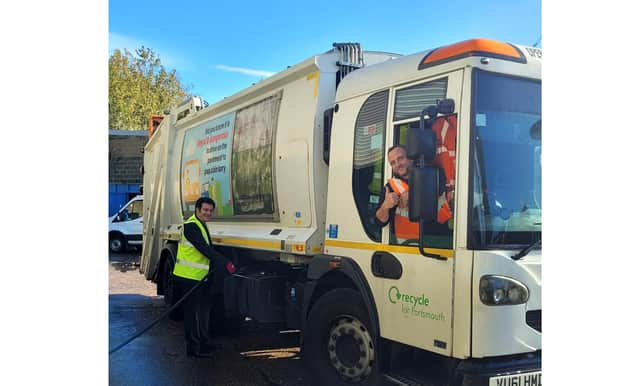Clean air zone: Portsmouth bin lorries will be converted to run on vegetable oil


The city council’s waste collection vehicles will be using a cleaner, greener fuel created from vegetable oil in order to comply with the zone, which is due to start in the city on November 29.
Many of the council's own collection vehicles will be working in the CAZ so the council, working with Biffa, is changing to a cleaner fuel.
Advertisement
Hide AdAdvertisement
Hide AdCllr Dave Ashmore, cabinet member for community safety and environment, said: ‘I welcome this move that will benefit the whole city by offering a greener way of collecting waste. As a council, we declared a climate emergency in 2019 and set the goal to reach carbon neutrality by 2030, and that means every part of the council needs to play their part.’
Cllr Kimberly Barrett, cabinet member for climate change and the green recovery, said: ‘Air pollution is the biggest environmental killer in the UK, so it’s vital for us to take steps to make the air we breathe cleaner for everyone. Eleven HGV’s using the new fuel produce the same CO₂e as one HGV using regular diesel, and that's the change we need to see locally.’
The fuel, called Green D+ HVO, is a sustainable renewable substitute for diesel and entirely made from materials such as used cooking oils and other waste oils. It does not contain any virgin crop.
Through using Green D+ HVO fuel, greenhouse gas emissions that contribute to pollution and smog are vastly reduced when compared to regular diesel, helping to improve the air quality in the city.
Advertisement
Hide AdAdvertisement
Hide AdThe clean air zone will be put in place in the south-west corner of the city, one of 60 ordered by the government for areas which have high air pollution levels.
The drivers of taxis, buses, coaches, private hires and heavy duty vehicles that are older than Euro six if diesel, and Euro four if petrol, will be charged.
Those who drive newer, cleaner vehicles, personal cars and vans will not be charged.
